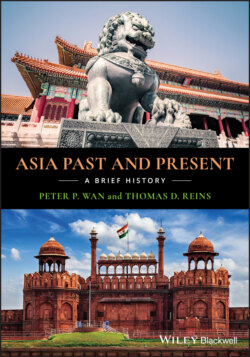Читать книгу Asia Past and Present - Peter P. Wan - Страница 49
The Tang Dynasty (618–907): The “Golden Age” of Imperial China
ОглавлениеChaos followed the murder of the Sui emperor. A frontier general of the Sui Dynasty, Li Yuan (566–635), seized the throne and founded the Tang Dynasty. But one of his younger sons, Li Shimin (posthumously titled Tang Taizong, 599–649), soon staged a bloody coup d’état, killing the crown prince and forcing his father to abdicate and pass the throne on to him. He justified his conduct by claiming that the crown prince was plotting to kill him and he was only reacting to the threat.
Emperor Tang Taizong had the nickname “Green‐Eyed Lad,” which is an unmistakable indication of his Xianbei heritage. And that is not surprising, since the ruling families of both the Sui and Tang Dynasties were racially mixed for many generations.
Chinese historians proudly refer to Early Tang as the “Golden Age” of imperial China. The founding of the Tang regime came at the perfect juncture of history, for the nation was ready for great things. The newly reunified country would soon boast of a population of 90 million (in 755) and a territory of 12.50 million square kilometers (in 669). It would be the most powerful and longest‐lasting imperial dynasty in Chinese history.
Emperor Tang Taizong had a proven record of being an outstanding military commander and civil administrator from the days when he was helping his father in the fight to seize the throne. He had also taken to heart the historical lesson of how Sui Yangdi’s despotism had cost him his life and his empire. So, despite his exceptional ability, he modestly sought council and encouraged advice and criticism. He declared upon his coronation that he would adopt policies to ban extravagance, tighten expenditures, reduce taxes and labor service, and select frugal and law‐abiding officials, in order to allow the common people to recuperate and enjoy an abundance of food and clothing. Many historians honor Emperor Tang Taizong as the “model emperor” of imperial China, mainly for his capacity to accept criticism and advice, and his achievements during the 22 years of his reign.
